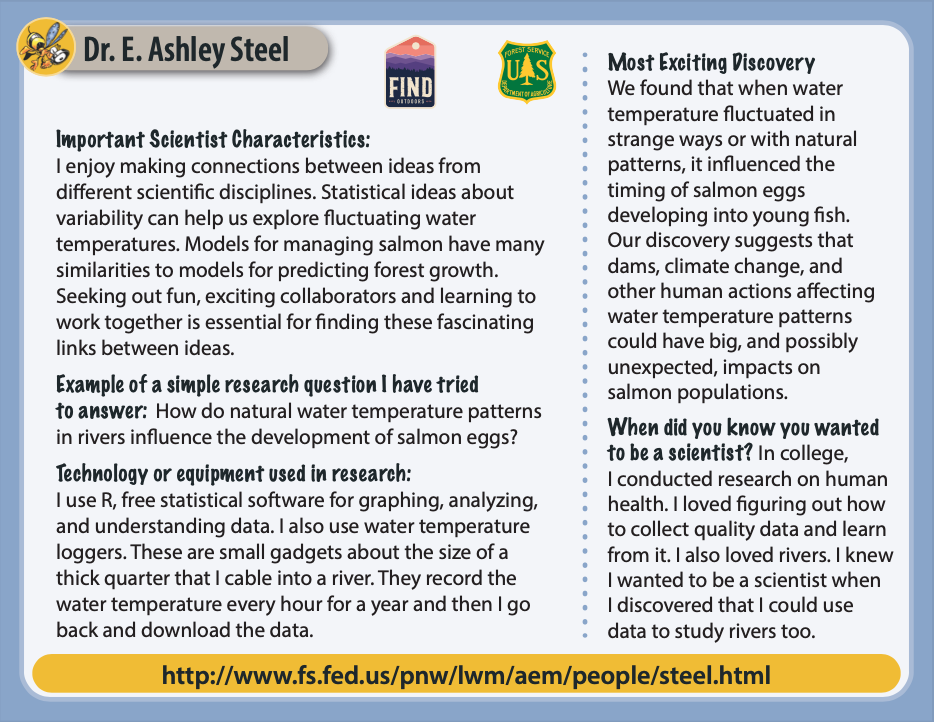Water


E. Ashley Steel, Quantitative Ecologist

- Ph.D., University of Washington-Seattle
- USDA Forest Service Scientist
- A quantitative ecologist uses mathematical skills and ideas to better understand forests, rivers, oceans, fish, wildlife, climate, and more.
- Ph.D., University of Washington-Seattle
- USDA Forest Service Scientist
- A quantitative ecologist uses mathematical skills and ideas to better understand forests, rivers, oceans, fish, wildlife, climate, and more.


Kathleen Matthews, Aquatic/Fish Ecologist

- Ph.D., University of Washington
- USDA Forest Service Scientist
- I am an aquatic ecologist researching native fish and amphibians in high elevation ecosystems. I work primarily in the Sierra Nevada of California.
- Ph.D., University of Washington
- USDA Forest Service Scientist
- I am an aquatic ecologist researching native fish and amphibians in high elevation ecosystems. I work primarily in the Sierra Nevada of California.


Wendell Haag, Aquatic Ecologist

- Ph.D., University of Mississippi
- USDA Forest Service Scientist
- As an aquatic ecologist I study animals that live in rivers and lakes and how they interact with each other and their habitats.
- Ph.D., University of Mississippi
- USDA Forest Service Scientist
- As an aquatic ecologist I study animals that live in rivers and lakes and how they interact with each other and their habitats.


Becky Flitcroft, Ichthyologist

- Ph.D., Oregon State University
- USDA Forest Service Scientist
- An ichthyologist studies fishes. The word ichthyologist comes from the Greek words “ikthus” which means fish and “logos” which means study.
- Ph.D., Oregon State University
- USDA Forest Service Scientist
- An ichthyologist studies fishes. The word ichthyologist comes from the Greek words “ikthus” which means fish and “logos” which means study.


Tim Baldwin, Herpetologist

- Ph.D., Alabama A&M University
- USDA Forest Service Scientist
- A herpetologist studies reptiles and amphibians. I assess how reptile and amphibian populations respond to forest management and land-use changes.
- Ph.D., Alabama A&M University
- USDA Forest Service Scientist
- A herpetologist studies reptiles and amphibians. I assess how reptile and amphibian populations respond to forest management and land-use changes.


Carolyn Hunsaker, Ecologist

- Ph.D., University of California
- USDA Forest Service Scientist
- An ecologist studies the relationship of living things with the living and nonliving environment. I study the forest vegetation, soils, climate, air quality, stream organisms, and water quantity and quality.
- Ph.D., University of California
- USDA Forest Service Scientist
- An ecologist studies the relationship of living things with the living and nonliving environment. I study the forest vegetation, soils, climate, air quality, stream organisms, and water quantity and quality.


Katherine J. Elliot, Forest Ecologist

- Ph.D., University of Maine
- USDA Forest Service Scientist
- A forest ecologist studies interactions among plants, animals, energy, water, and nutrients. A forest ecologist also studies how all of these things relate to patters and processes in forest ecosystems.
- Ph.D., University of Maine
- USDA Forest Service Scientist
- A forest ecologist studies interactions among plants, animals, energy, water, and nutrients. A forest ecologist also studies how all of these things relate to patters and processes in forest ecosystems.


Robert Deal, Research Forester

- Ph.D., Oregon State University
- USDA Forest Service Scientist
- As a research forester, I conduct research on applied silviculture. Silviculture is the art and science of establishing and growing trees to meet the needs and values of landowners.
- Ph.D., Oregon State University
- USDA Forest Service Scientist
- As a research forester, I conduct research on applied silviculture. Silviculture is the art and science of establishing and growing trees to meet the needs and values of landowners.


Kenneth L. Clark, Research Forester

- Ph.D., University of Florida
- USDA Forest Service Scientist
- A research forester studies forest composition, structure, and functioning, such as productivity and nutrient cycling.
- Ph.D., University of Florida
- USDA Forest Service Scientist
- A research forester studies forest composition, structure, and functioning, such as productivity and nutrient cycling.


Don C. Bragg, Project Leader & Research Forester

- Ph.D., Utah State University
- USDA Forest Service Scientist
- Foresters study many aspects of trees and forests, from traditional silviculture to carbon storage to the relationship between humans and trees. My forestry research concentrates on the ecology and management of pine forests in the southern United States.
- Ph.D., Utah State University
- USDA Forest Service Scientist
- Foresters study many aspects of trees and forests, from traditional silviculture to carbon storage to the relationship between humans and trees. My forestry research concentrates on the ecology and management of pine forests in the southern United States.



